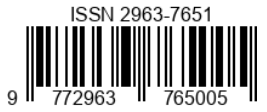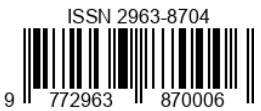Kewenangan Memeriksa dan Mengadili Pengadilan Militer dalam Penyelesaian Tindak Pidana Umum yang Dilakukan oleh Anggota Militer
DOI:
https://doi.org/10.55606/jhpis.v3i4.4459Keywords:
Authority, Military, TNIAbstract
The TNI as a means of defense of the Unitary State of the Republic of Indonesia has a noble task. Even though it has a noble task, the TNI is still the same as society in general which has the possibility of committing criminal acts. In practice, TNI who commit criminal acts will be investigated and tried in a Military Court. It turns out that several laws and regulations relating to the authority of the Military Court contain conflicts between one law and another law. The authority to examine and adjudicate courts within the Military justice environment in resolving general crimes committed by the TNI as stated in Article 3 paragraph (4a) of MPR Decree Number VII/MPR/2000 jo. Article 65 Paragraph (2) of Law of the Republic of Indonesia Number 34 of 2004 concerning the Indonesian National Army is apparently different from the authority of military justice contained in Law no. 31 of 1997 regarding Military Justice. In order to answer this question, research was conducted, as well as to provide an explanation regarding the resolution of general crimes committed by the TNI. This research is normative research, using a statutory approach and a conceptual approach. The research results found that the resolution of general crimes committed by the TNI was still carried out in the Military Court, referring to the legal principle of lex specialis derogate legi generali. The resolution of general crimes committed by the TNI is carried out through legal trials, consisting of the stages of investigation, prosecution, examination and proof, and the execution stage.
Downloads
References
Arief Fahmi Lubis. (2021). Penegakan hukum dalam mengadili anggota militer yang melakukan tindak pidana umum. Jurnal Media Administrasi, 6(1), 67–77. https://doi.org/10.56444/jma.v6i1.1130
Badu, L. W., & Apripari. (2022). Menggagas tindak pidana militer sebagai kompetensi absolut peradilan militer dalam perkara pidana. Jurnal Legalitas, 12(1), 57–81.
Deliarnoor, N. A., & Suseno, S. (2013). Pengertian dan ruang lingkup tindak pidana khusus. Modul 1, 2, 1–69.
Edy, S. S. (2017). Independensi sistem peradilan militer di Indonesia (Studi tentang struktur peradilan militer). Jurnal Hukum Dan Peradilan, 6(1), 105. https://doi.org/10.25216/jhp.6.1.2017.161
Irsyad, M. (2021). Hukum dan penyelesaian konflik hukum. De Lega Lata: Jurnal Ilmu Hukum, 6(2), 389–395. http://jurnal.umsu.ac.id/index.php/delegalata/article/view/7836
Ketetapan Majelis Permusyawaratan Rakyat Republik Indonesia Nomor VII/MPR/2000 tentang peran Tentara Nasional Indonesia dan peran Kepolisian Negara Republik Indonesia dengan rahmat Tuhan Yang Maha Esa. Majelis Permusyawaratan Rakyat Republik Indonesia. (2000). https://uu.vlsm.org/MPR/2000/TAP-MPR-2000-007-PERAN-TENTARA-NASIONAL-INDONESIA-DAN-PERAN-KEPOLISIAN-NEGARA-REPUBLIK-INDONESIA.pdf
Muhammad, A. (2004). Hukum dan penelitian hukum (Cet. 1). Bandung: Citra Aditya Bakti.
Nitit, Y. W., & Saksono, M. S. (2023). Prinsip dan dinamika sistem pertahanan Negara Kesatuan Republik Indonesia dalam keikutsertaan rakyat. Jurnal Mahatvavirya, 10(1), 1–14.
Pebrianto, R. (2024). Kebijakan hukum pidana tentang pemeriksaan prajurit TNI yang melakukan tindak pidana umum. SEIKAT: Jurnal Ilmu Sosial, Politik Dan Hukum, 3(1), 71–80. https://doi.org/10.55681/seikat.v3i1.1194
Peraturan Menteri Pertahanan No. 16/2012, Pub. L. No. 16, No. 43. Menteri Pertahanan Republik Indonesia. (2012).
Primadanti, M. (2022). Peran atasan yang berhak menghukum dan perwira penyerah perkara dalam proses penyelesaian perkara tindak pidana desersi di peradilan militer. Braz Dent J, 33(1). Universitas Sriwijaya.
Ragil Jaka Utama. (2022). Analisis hukum kewenangan absolut penyelesaian perkara tindak pidana umum yang dilakukan oleh prajurit TNI. Braz Dent J, 33(1). Universitas Islam Sultan Agung Semarang.
Sagala, P., & Ferdian, F. (2017). Yurisdiksi peradilan militer dalam kekuasaan kehakiman di Indonesia. E-Journal Peradilan Militer, 1–20.
Sodikin, N. (2021). Eksistensi asas kepentingan militer dalam penjatuhan hukum disiplin guna menjaga profesionalitas dan disiplin prajurit. Jurnal Perspektif Mulai Penerbitan, 1(1).
Sugistiyoko, B. (2018). Tindak pidana desersi secara in absensia anggota militer. Bismarnasution, 4(1), 1–79. https://bismarnasution.com/tindak-pidana-korporasi/
Taufiq, S. (2024, March 8). Pelanggaran oknum prajurit TNI naik 0,76% di 2023, terbanyak kedisiplinan. Detik News. https://news.detik.com/berita/d-7231618/pelanggaran-oknum-prajurit-tni-naik-0-76-di-2023-terbanyak-kedisiplinan
Undang-Undang No. 31 Tahun 1997 tentang Peradilan Militer. Nucl. Phys., 13, 1 (1997).
Undang-Undang Republik Indonesia No. 34 Tahun 2004 tentang Tentara Nasional Indonesia. Pub. L. No. 34, 1 (2004).
Wasiska, Y. F., & A. (2023). Tindak pidana dan unsur-unsurnya versus deelgenomen delicten/tindak pidana penyertaan versus pertanggungjawaban tindak pidana. Jurnal Ilmiah Manazir, 1(1), 57–71.
Yohanawati, R., & Zulfiko, R. (2024). Tinjauan normatif terhadap penegakan hukum tipikor yang dilakukan oleh TNI: Studi kasus Basarnas RI. Sumbang12 Law Journal, 2(2), 47–59.
Downloads
Published
How to Cite
Issue
Section
License
Copyright (c) 2024 JURNAL HUKUM, POLITIK DAN ILMU SOSIAL

This work is licensed under a Creative Commons Attribution-ShareAlike 4.0 International License.








